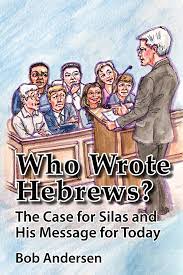New book:
"God’s interactions with Israel were a foreshadowing of the perfect
reality in the person of Jesus: absolutely God and absolutely human.
Jesus came to earth to establish his kingdom and all that God had
initiated in the old covenant. There is a continuity of theological
understanding as we move from the Old Testament to the letter sent to
the Christians in Rome.
The discussion on the theology of mission in the New Testament
usually focuses on Jesus and Paul, with minimal attention given to the
General Epistles. However, Reading Hebrews Missiologically tries to fill
that gap and focuses on the theology of mission in the book of Hebrews
and fleshes out the unique contribution it has to the discussion of a
New Testament theology of mission. The twelve contributors—from various
theological, geographical, and missiological contexts—explore the
missionary motive, the missionary message, and the missionary method of
the Epistle to the Hebrews.
All Scripture can be read missiologically, and the letter to the
Hebrews, with its emphasis on the supremacy of Christ, is no exception.
We pray that this book will inspire fresh approaches to practical
mission in the world today."





